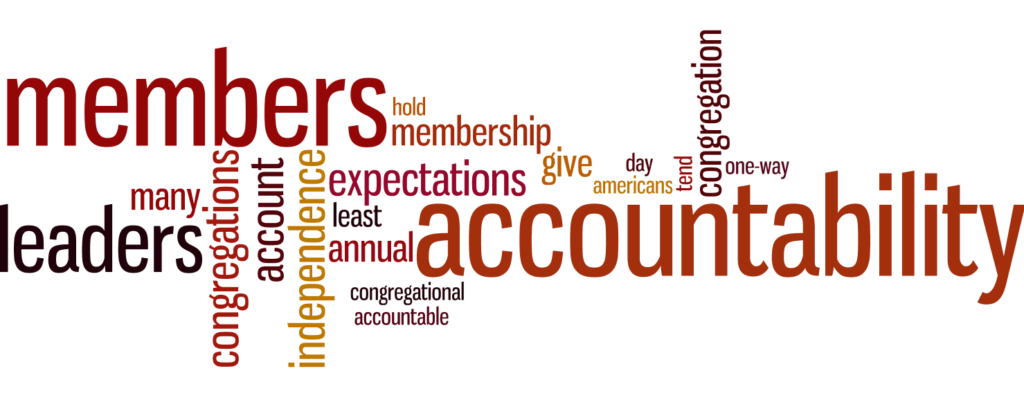 Americans recently celebrated Independence Day, an event associated, at least in my childhood mind, mainly with fireworks. In recent years, another July 4 ritual has gained popularity: public readings of the Declaration of Independence. I’ve come to appreciate the annual reminder that genuine authority derives from the consent of the governed, and not from the mere assertion of power by those who govern. We Americans have 241 years of conditioning in the importance of independence, but many of us are woefully lacking in our concept of accountability.
Americans recently celebrated Independence Day, an event associated, at least in my childhood mind, mainly with fireworks. In recent years, another July 4 ritual has gained popularity: public readings of the Declaration of Independence. I’ve come to appreciate the annual reminder that genuine authority derives from the consent of the governed, and not from the mere assertion of power by those who govern. We Americans have 241 years of conditioning in the importance of independence, but many of us are woefully lacking in our concept of accountability.
The challenge is particularly acute in voluntary associations such as congregations, where (aside from highly sectarian groups) there is little likelihood that members will be held accountable for behavior that violates the norms and values of the group. After all, if I don’t like how I’m treated in Congregation X, I can simply go down the street to Congregation Y.
The absence of mechanisms for accountability is widespread in U.S. culture. I’ve witnessed its consequences in congregations of multiple denominations and faith traditions. Over time, the independence of Americans—and the reluctance of their leaders to act in ways that might be perceived as punitive—tend to neuter any meaningful accountability for members.
The Meaning of Accountability
Our failures in accountability may stem from a misunderstanding of the meaning of accountability. Literally, accountability means simply the ability to give an account. Accountability can be defined as the obligation of an individual or organization to account for its activities. The Christian scriptures offer a similar insight in I Peter 3:15: “Always be prepared to give an answer [an account] to everyone who asks you to give the reason for the hope that you have.”
But in modern congregational life accountability has become a one-way street. Leaders are properly expected to account for their leadership and management of the congregation—at least through annual financial and narrative reports. Questions at congregational, judicatory and denominational meetings are generally focused on leaders, with the assumption that it’s members’ job to hold their leaders accountable. But for members, there is little or no expectation of accountability at all.
Those with greater authority should be held to a higher standard of accountability: “To whom much is given much will be required” (Luke 12:48 NRSV). Yet the nearly universal absence of accountability for members has led many religious systems into a toxic, one-way relationship between leaders and followers. Members are eager to hold leaders accountable but resist any corresponding expectation for themselves. Such a dynamic tends to produce severe over-functioning by leaders and pervasive under-functioning by followers. As a result, many leaders burn out and many members drop out.
Encouraging Accountability
Is there a way out of this trap? I suggest three principles to encourage mutual accountability:
- Clarify your expectations of membership. What does it mean to be a “member” of your congregation or association? Are the expectations clear and in writing? How are they communicated to prospective members? While it may seem counte-rintuitive, congregations with high expectations for of membership tend to grow, while those with low or fuzzy expectations tend to decline.
- Review membership expectations at least annually. Some congregations hold an annual ritual of “membership re-covenanting.” Others invite members to share publicly what their faith and participation in the life of the congregation means to them. What seems most important is to offer members regular opportunities to “give account.”
- Conduct annual “performance reviews,” not just of staff but also of members. In my tradition, this used to be done through the annual “deacons’ visit.” Lay leaders visited members’ homes to ensure that they were properly “following the way.” Our individualistic culture no longer tolerates this level of intervention, but there are other culturally-appropriate ways of conducting performance reviews of members. One option is to provide a self-assessment questionnaire each year to members where they can reflect on their participation. Although not common at the level of congregational membership, such instruments do exist for board members and could be modified. Another approach is to provide discussion guides for use in small groups or religious education classes.
One reason leadership in congregations has become an enervating burden for so many is that accountability expectations focus too exclusively on leaders. Independence and freedom are important rights—it’s good to celebrate them at least annually. But healthy congregations require mutual accountability, not one-way avenues of praise and blame.
Now that we’ve celebrated Independence Day, let’s proclaim an Accountability Day as well, when we invite everyone—members and leaders alike—to “give account.” It is not enough to ask, “How is our rabbi/priest/pastor doing?” We must also ask, “How am I doing?”
[box] David Brubaker has consulted on organizational development and conflict transformation in the U.S. and in a dozen other countries. He is the author of Promise and Peril, an Alban book on managing change and conflict in congregations. David holds a PhD from the University of Arizona and an MBA from Eastern University, and teaches organizational studies as an associate professor at Eastern Mennonite University. email David[/box]
David Brubaker has consulted on organizational development and conflict transformation in the U.S. and in a dozen other countries. He is the author of Promise and Peril, an Alban book on managing change and conflict in congregations. David holds a PhD from the University of Arizona and an MBA from Eastern University, and teaches organizational studies as an associate professor at Eastern Mennonite University. email David[/box]
